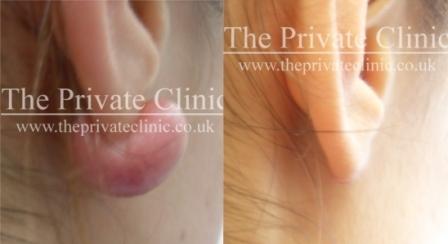
Treatment Guide FAQ: Keloid Scars (Keloids)
Keloid scarring is a common skin problem, commonly associated with darker skin types but can happen to any skin type. A keloid scar is a raised scar that has grown too much over the original skin damage and can be permanent. The good news is that there are a number of treatments available.

What is a keloid scar?
Sometimes after a cut heals it leaves behind a bumpy, raised scar that has grown too much. They can even grow larger than the original wound. Initially it is often red in colour but may darken or grow paler over time. They may feel rubbery and the actual keloid scar will be hairless and shiny.
They are common all over the body but particularly the upper chest and earlobes. They are most common in areas of skin tension, such as across the chest and shoulders, and areas of skin trauma (piercings, tattoos and acne)
- Infected scars, burns and acne scars are the scars most at risk
- They are not contagious or cancerous
- Growth can occur for a few weeks/months, slow down or continue for a long time. Rapid growth can also occur
- Keloid scars can be easily diagnosed by a doctor, with no need for tests
Who gets keloid scarring?
Keloid scarring can happen to anyone but is most commonly found in darker skin types, especially black skin. Keloids can run in families. Prevention is very important so if it runs in your family take extra care. Such scarring is most common between the ages of 10 and 30.
Why do people get keloid scars?
It is not known why some people get keloids and others don’t. However there are several theories, including:
- Dysfunction of parts of the body that affect cell growth
- Collagen abnormalities
- Inherited abnormal body response to dermal injuries
- Sebum immune reaction
What are the symptoms of a keloid scar?
There may not be any other symptoms other than the keloid scar itself. However some may experience pain, itchiness, tenderness or a burning sensation. Tight keloids can inhibit the full movement of nearby joints.
Do I have a keloid scar or a hypertrophic scar?
Keloid scars are very different to hypertrophic scars. Keloid scars can happen very easily, from as little as an acne spot (in the worst cases they may be spontaneous), and can spread considerably further than the original wound. They can be permanent. Whereas hypertrophic scars may look similar to keloid scars for a few months, they will then lessen and disappear over time.
How to avoid keloid scarring?
If you think you are at risk of this type of scarring forming, please do try to avoid body piercing and tattoos. Please also try to avoid elective cosmetic skin treatments, unless fully discussed with medical professionals and only with their support. Please also be very careful with acne and treat it as much as possible and as quickly as possible.
What treatments are available for keloid scars?
Please see your GP first of all so they can assess if it is indeed a keloid scar and to rule out any other potential problems. Keloid may or may not continue to grow over time but to be safe please seek treatment advice as soon as possible. Keloids can be complicated to treat so please do choose an experienced professional.
- Steroid injections for keloid scars – over time these can flatten and reduce keloid scarring, a course is necessary
- Surgical excision for keloid scars – cuts out the keloid scar, may be used in combination with steroid treatments to reduce the risk of reoccurrence
- Cryotherapy – liquid nitrogen is applied to the scar for a few seconds to freeze the keloid and diminish their growth
- Steroid tape and Silicone sheets – Steroid-impregnated tape can also be used to try to flatten keloid scars but they must be used continuously for long periods of time.
Keloid Scar treatment at The Private Clinic
The Private Clinic was established in 1983 and has offered the most advanced, minimally invasive cosmetic and medical treatments ever since. We specialise in the latest and least invasive options with the best results so there is little downtime and discomfort involved.
Our medical team have many years of experience treating darker skin types and patients with keloid scars. Darker skin types require considerable knowledge and experience to treat properly.
Our Consultant Dermatologist; Dr Rishika Sinha, MA(Cantab), MB BChir, MRCP(Derm). GMC Number: 6092256 is able to consult on the condition at our London Harley Street clinic, while our surgeons are available at all of our clinics located in Birmingham, Bristol, Buckinghamshire, Leeds, Manchester and Northampton
To find out about our effective keloid scar treatments please call 0333 920 2471 or use our keloid scarring online contact form.








